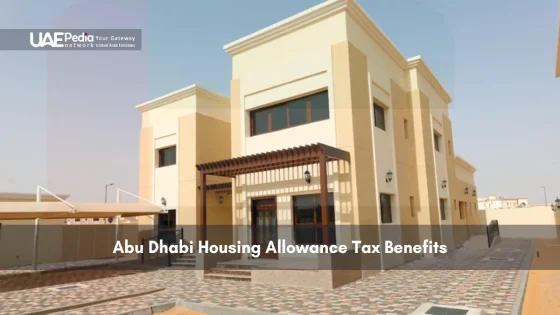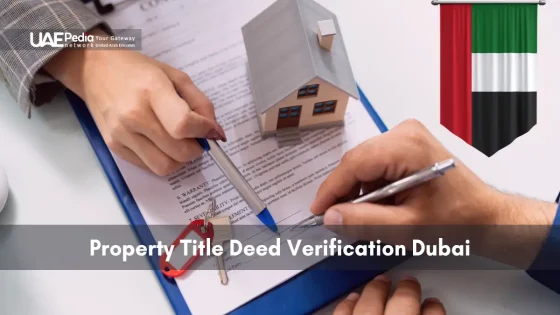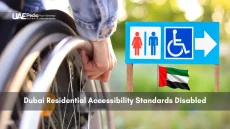What if you could keep more of your paycheck while living in a city where futuristic skylines meet golden deserts? The UAE’s zero personal income tax policy makes it a magnet for global professionals – but here’s the twist: U.S. citizens still need to navigate IRS obligations.
Abu Dhabi shines as a hub for financial flexibility, especially through employer-provided housing perks. These allowances aren’t just about covering rent – they’re strategic tools for maximizing your take-home pay in a region that values both innovation and cultural heritage.
While the Emirates eliminate local income taxes, American expats must juggle dual reporting rules. This guide unpacks how to optimize your financial setup without tripping over paperwork. You’ll learn practical steps for filing requirements, leveraging housing benefits, and collaborating with specialists like Taxes for Expats to simplify compliance.
- Discover how housing allowances differ from standard salary structures
- Understand the balance between UAE tax advantages and U.S. obligations
- Learn timeline-sensitive strategies for documentation and filings
Introduction to Abu Dhabi Housing Allowance Tax Benefits
Imagine settling into a city where your earnings stretch further under the sun. Many professionals find their compensation packages here include financial perks designed to offset living costs – with housing support often taking center stage.
Overview of Housing Allowance Benefits
Employers in the Emirates frequently structure salaries to include monthly stipends for accommodation. These arrangements let workers redirect funds they’d typically spend on rent toward savings or experiences. Unlike taxed income in other regions, these allocations often remain untouched by local levies.
Why Expats Choose Abu Dhabi
The city merges modern convenience with cultural richness – think rooftop pools overlooking historic souks. Financial advantages play a role too:
“While VAT exists at 5%, the absence of personal income charges creates a unique economic landscape,”
notes a Taxes for Expats advisor. Compare this setup to other global hubs:
| City | Income Tax Rate | VAT | Average Housing Support |
|---|---|---|---|
| Abu Dhabi | 0% | 5% | 30-40% of salary |
| New York | 24-37% | 8.875% | 5-15% |
| London | 20-45% | 20% | 10-20% |
You’ll notice immediate differences in take-home pay potential. Combined with lower utility costs and premium healthcare access, it’s easy to see why professionals flock here. Later sections will unpack how to navigate reporting requirements while maximizing these advantages.
Understanding the UAE Tax Landscape for Expats
Ever wondered how working abroad feels like a financial superpower? The Emirates’ zero personal income tax policy turns that fantasy into reality – but there’s more beneath the surface. Let’s unpack what “tax-free” truly means here and how it dances with your home country’s rules.
The Appeal of a Tax-Free Environment
Picture keeping every dirham you earn beyond basic living costs. That’s daily life here. Unlike New York or London, where income taxes slice 20-45% off paychecks, the UAE lets professionals reinvest those funds. Want to ski indoors one weekend and dune bash the next? Your salary stretches further here.
But watch for myths. While personal income stays untouched, indirect taxes exist:
| Tax Type | UAE Rate | US Equivalent |
|---|---|---|
| Corporate Tax | 9% (over $102k profit) | 21% federal |
| VAT | 5% | 0-13% state |
| Property Transfer | 4% | 0.5-2% |
US Tax Obligations for Global Income
Here’s the catch: Uncle Sam still wants his share. As one expat advisor puts it:
“The IRS treats worldwide income like a long leash – you might roam far, but they’re still holding the other end.”
Smart strategies help. The Foreign Earned Income Exclusion lets Americans exclude up to $120k (2023) from taxable income. But housing allowances? Those often require separate forms like 2555. Pro tip: UAE Golden Visa holders still file IRS returns – residency perks don’t override citizenship duties.
Choosing between Dubai and Abu Dhabi? Both offer tax advantages, but Abu Dhabi’s lower living costs mean housing allowances go further. Either way, dual reporting stays essential. Master this balance, and you’ll unlock the Emirates’ full financial potential.
Navigating US Tax Requirements While Living Abroad
Did you know your passport comes with a tax bill, no matter where you unpack your suitcase? American expats face a unique challenge: reporting every dollar earned globally to the IRS. Let’s simplify this process so you stay compliant without losing sleep.
Worldwide Income Reporting Essentials
The IRS requires all US citizens and green card holders to file Form 1040 annually – even if you haven’t stepped foot stateside in years. Here’s the kicker: this includes foreign earnings like salaries, rental income, and certain allowances. Automatic extensions give expats until June 15 to file (with October 15 available upon request), but taxes owed still accrue interest from April 15.
Common pitfalls to dodge:
| Mistake | Consequence | Smart Fix |
|---|---|---|
| Missing FBAR filings | $10k+ penalties | Report foreign accounts over $10k |
| Ignoring housing benefits | Audit triggers | Track allowance details monthly |
| Overlooking Form 2555 | Lost exclusions | Claim up to $120k income exclusion |
“One client nearly paid $8k in unnecessary taxes because they didn’t realize their UAE rent stipend qualified for the Foreign Housing Exclusion,”
Three steps keep you penalty-free:
- Organize payslips and bank statements quarterly
- Consult a specialist familiar with US-UAE tax treaties
- File even if you owe nothing – silence alarms the IRS
While the Foreign Tax Credit can offset some liabilities, professional guidance becomes crucial when dealing with complex cases like stock options or multiple income streams. Remember: compliance isn’t optional, but stress-free filing is achievable.
Exploring the Foreign Housing Exclusion and Deduction
Picture this: Your rent payments become a secret weapon for trimming your tax bill. The IRS offers two paths to reduce your taxable income through housing costs abroad – but only if you know the rules. Let’s decode these tools so you can claim what’s rightfully yours.
Eligibility Under the Bona Fide Residence and Physical Presence Tests
To qualify, you’ll need to pass one of two IRS checkpoints. The bona fide residence test asks: “Does your life revolve around another country?” Think permanent job contracts, local bank accounts, and family ties. The physical presence test is simpler – spend 330 full days outside the U.S. within 12 consecutive months.
Example: Sarah, a teacher in the Gulf, qualifies through bona fide residency. Her colleague Mark, who job-hopped between countries, used the 330-day rule instead. Both filed Form 2555 to claim their benefits.
Employer-Provided Housing vs. Self-Employed Expenses
Company housing perks work differently than freelance arrangements. Employees often exclude allowance amounts up to IRS limits (calculated as 30% of maximum foreign earned income exclusion). Self-employed folks deduct actual costs – but only reasonable expenses count.
“We once had a client try to claim a $15k gold-plated showerhead as a housing expense. The IRS disallowed it faster than you can say ‘audit’,”
Approved costs include:
- Rent or lease payments
- Utilities (except phone/cable)
- Basic furnishings (rented, not owned)
Remember: The housing exclusion applies before calculating your earned income exclusion. Track every receipt – especially if your rent exceeds 16% of the annual exclusion limit. Proper documentation turns confusing IRS forms into powerful savings tools.
Maximizing Your Savings with Housing Allowance Benefits
What separates expats who thrive financially from those who just scrape by? Often, it’s knowing how to transform standard benefits into turbocharged savings. Let’s explore smart moves that keep more dirhams in your pocket while staying compliant.
Strategies to Optimize Tax Benefits
Start by structuring your compensation package wisely. Negotiate for direct housing payments instead of lump-sum salaries – this keeps certain amounts excluded from taxable calculations. One client reduced their IRS bill by 18% simply by reallocating 35% of their base pay into accommodation stipends.
Budgeting plays a crucial role. Track expenses against the Foreign Housing Exclusion limits using apps like Mint. As a Taxes for Expats specialist advises:
“Treat your allowance like a separate account – never mix it with personal funds. Clean records prevent audit headaches.”
Review employment contracts annually. Look for clauses allowing adjustments based on rental market shifts. When Sarah’s Abu Dhabi landlord raised rates, her company increased her stipend by 12% – tax-free.
Three quick wins:
- Claim utility bills as part of excluded housing costs
- Use the Physical Presence Test if frequently traveling
- File amended returns if past allowances were misreported
While DIY approaches work for simple cases, complex situations demand expertise. A 45-minute consultation saved one family $23k through overlooked deductions. Remember: Strategic planning today builds financial freedom tomorrow.
Essential Filing Tips and Key Documentation
What’s the secret to turning tax paperwork into a treasure map? It starts with knowing which forms unlock hidden savings. Let’s explore the tools that transform chaotic filings into streamlined processes.
Mastering the IRS Maze
Form 2555 acts as your golden ticket for housing cost exclusions. Follow this battle-tested approach:
- Calculate qualified housing expenses (rent, utilities, insurance)
- Subtract the base amount (16% of foreign earned income exclusion)
- Enter results on Lines 45-48 of Form 2555
Required documentation resembles a travel checklist:
| Document | Purpose | Retention Period |
|---|---|---|
| Lease agreements | Verify housing costs | 7 years |
| Utility bills | Support expense claims | 3 years |
| Bank statements | Track allowance deposits | 5 years |
“I’ve seen clients miss six-figure savings by skipping Line 21’s exclusion calculations. Don’t be that person.”
Three filing hacks every global worker needs:
- Set calendar reminders for June 15 filing deadline
- Use cloud storage with date-stamped folders
- Flag receipts showing local currency conversions
Watch for these tripwires:
- Mixing personal/vacation days in physical presence counts
- Forgetting to convert dirhams to USD using IRS rates
- Omitting employer-provided housing details
When complex scenarios arise – think multiple income streams or freelance work – partner with specialists. Automated tools like ExpatFile can handle basic filings, but human expertise shines for nuanced cases. Remember: Organized records today mean stress-free filings tomorrow.
Criteria for UAE Residency and Its Impact on Taxes
How many sunsets does it take to call the Emirates home? The magic number starts at 183. This threshold determines whether you’re considered a resident for tax purposes – a status that unlocks financial advantages while triggering specific reporting duties.
Mastering the 183-Day Rule
Spend over half the year in the UAE, and you’ll need to prove it. Airlines apps become your best friend – flight itineraries and passport stamps serve as evidence. A Taxes for Expats specialist notes:
“We’ve seen cases where missing three days cost clients their residency status. Track every entry and exit like it’s a financial transaction.”
| City | Days Required | Proof Options | Grace Period |
|---|---|---|---|
| Abu Dhabi | 183+ | Lease, utility bills | 30 days |
| Dubai | 183+ | Employment contract | 60 days |
Establishing Your Primary Residence
Abu Dhabi requires three key documents: signed lease agreements, monthly utility statements, and a registered Emirates ID. Unlike Dubai’s streamlined portal, the capital often requests in-person submissions. Common hiccups include:
- Mismatched dates between lease and arrival stamps
- Shared accommodations without all tenants listed
- Delayed ID processing during peak seasons
Sync your residency calendar with IRS filing dates. Digital tools like Expatchron help automate day counts while flagging potential overlaps. Remember: Your physical presence here affects both local perks and Form 2555 eligibility.
Corporate and Indirect Taxes: What Expats Need to Know
New corporate rules are reshaping the desert’s financial dunes – here’s your map. While personal income remains untouched, businesses now navigate a 9% rate on profits over 375,000 AED ($102k). This shift impacts expat entrepreneurs differently than multinationals. Let’s chart what matters for your venture.
Navigating Recent Corporate Tax Changes
Since June 2023, companies crossing profit thresholds face revised calculations. Free zones still offer 0% rates for qualified activities, but mainland operations require careful planning. A Taxes for Expats advisor shares:
“We helped a consulting firm save 28% by restructuring into two entities – one free zone, one mainland. Creativity thrives within compliance.”
Compare key business charges:
| Tax Type | Threshold | Rate |
|---|---|---|
| Corporate | >375k AED profit | 9% |
| VAT | 375k+ AED turnover | 5% |
| Excise | Specific goods | 50-100% |
Three moves keep costs manageable:
- Separate personal and business accounts – mixed funds complicate deductions
- Claim allowable expenses like office rent and employee training
- File returns within 9 months of fiscal year-end to avoid penalties
Indirect taxes hit daily spending too. A family spending 10k AED monthly pays 500 AED in VAT – nearly triple 2017 rates. Track these increases when budgeting school fees or car leases.
Smart operators balance compliance with opportunity. Review contracts quarterly, and remember: corporate rates apply to net profits, not revenue. With the right strategy, that 9% becomes just another line item – not a profit killer.
Local Taxes and Their Impact on Daily Expenses
Ever feel like your grocery receipt has a hidden fee whispering “surprise!”? The UAE’s 5% value-added tax (VAT) operates like a quiet companion on everyday purchases – but savvy expats learn to dance with it gracefully.
This levy applies to most goods and services, from café lattes to smartphone repairs. However, essentials like doctor visits and school tuition remain untouched. A Taxes for Expats advisor explains:
“Think of VAT as a participation fee for non-essentials – your morning croissant gets taxed, but your child’s math tutor doesn’t.”
Understanding VAT on Goods and Services
Let’s break down a typical monthly budget for a family of four:
| Category | Monthly Spend (AED) | VAT Impact |
|---|---|---|
| Groceries | 2,500 | 125 |
| Dining Out | 1,800 | 90 |
| Electronics | 600 | 30 |
Notice how discretionary spending carries the heaviest load. Now compare this to other global hubs:
- London’s 20% VAT nearly quadruples the tax on restaurant meals
- New York combines 8.875% sales tax with income deductions
- Singapore’s 9% GST applies even to healthcare
High-value purchases bring extra considerations. Property transfers incur 4% fees plus 2% agency charges – costs often overlooked during villa hunting. Three budgeting hacks help:
- Track expenses using apps that auto-categorize VAT charges
- Prioritize zero-rated services for medical and educational needs
- Negotiate housing stipends to cover predictable tax-inclusive costs
While VAT adds approximately 1,200 AED annually to average households, strategic planning neutralizes its bite. Pair this awareness with housing benefits, and you’ll master the art of thriving in the Emirates’ tax-light landscape.
Employer-Provided Benefits: Beyond the Housing Allowance
Think your paycheck only covers rent? Think again. UAE labor law mandates several perks that pad your compensation package like a well-stuffed camel saddle. Let’s unpack what else your employer might offer – and how it differs between the Emirates’ two powerhouse cities.
Compensation Packages Face-Off
While both emirates follow federal labor rules, local practices vary. Health insurance shines as a key differentiator:
| Benefit | Abu Dhabi | Dubai |
|---|---|---|
| Health Coverage | Full family plans | Employee-only basic |
| Flight Allowance | Annual economy | Biennial upgrades |
| School Fees | 50-70% coverage | 20-40% coverage |
End-of-service gratuity remains mandatory nationwide – 21 days’ pay per year for first five years, 30 days thereafter. One HR manager shares:
“We’ve seen companies sweeten deals with private school subsidies in Abu Dhabi, while Dubai firms often boost transportation allowances.”
Three often-overlooked perks:
- Professional development budgets (up to AED 15k/year)
- Telecom stipends for remote workers
- Wellness programs covering gym memberships
Smart negotiators focus on flexible benefit allocation. Ask about converting unused leave days into cash or extra flights home. Always review contract clauses about benefit adjustments during market shifts – your villa view shouldn’t come with hidden costs.
Remember: A robust package does more than cover bills. It becomes your financial safety net in the land of shifting sands.
A Closer Look at Filing Deadlines and Penalty Avoidance
Timing is everything when juggling IRS obligations across time zones. Missing key dates can turn paperwork into penalties faster than a sandstorm rolls in. Let’s map out your annual timeline with precision.
Key Tax Deadlines for US Expats
Three dates dominate every expat’s calendar:
| Deadline | Purpose | Extension | Penalty Risk |
|---|---|---|---|
| April 15 | Tax payments due | Automatic 2-month | Interest accrual |
| June 15 | Filing deadline | October 15 request | $435/month late fee |
| October 15 | Final extension | None | Full penalties apply |
The FBAR deadline mirrors federal filings – miss it, and fines can exceed $10k per violation. A Taxes for Expats specialist warns:
“Clients often forget that extensions push paperwork deadlines, not payment dates. Owing money? Pay by April 15 to stop the clock.”
Sync these dates with residency proofs like flight records and lease agreements. Use digital tools like TaxDay to track:
- Quarterly document scans (January/March/September)
- Currency conversion rates for foreign income
- Employer benefit statements
Set phone alerts 45 days before each deadline. Those managing multiple income streams should consult experts by December – peak season waits drown advisors by March. Remember: Organized filers transform stress into savings.
Expert Tools and Tips for Streamlined Tax Filing
Navigating tax season abroad doesn’t have to feel like solving a Rubik’s cube blindfolded. With the right tools and guidance, you can turn paperwork puzzles into quick wins. Let’s explore how professionals and tech simplify compliance while boosting your savings.
Leveraging Professional Tax Services
Specialists like Taxes for Expats decode IRS rules while maximizing exclusions. One client saved $14k by properly claiming foreign earned income through Form 2555 – a move their DIY software missed. As one advisor explains:
“We’re not just filing forms – we’re financial translators. Our team spots opportunities hidden in housing stipends and cross-border deductions.”
Benefits of Automated Payroll and Compliance
Modern systems track earnings, deductions, and deadlines in real time. Compare top platforms:
| Tool | Key Features | Cost |
|---|---|---|
| ExpatFile | Auto-converts currencies, FBAR alerts | $199/year |
| GlobalTax | Housing exclusion calculator | Free trial |
| PayrollPro | IRS form autofill | $29/month |
Three smart moves for stress-free filings:
- Schedule free consultations to assess your needs
- Use cloud storage for instant document access
- Sync payroll systems with tax software
Remember: Expert support isn’t a cost – it’s an investment in peace of mind. Most services offer discovery calls to map your unique situation without commitment.
Final Thoughts on Abu Dhabi Housing Allowance Tax Benefits
Living in a tax-friendly oasis comes with golden opportunities – and smart planning. This guide shows how blending local perks with IRS compliance creates a financial strategy as dynamic as the Emirates’ skyline. While zero income taxes boost savings, U.S. obligations remain non-negotiable.
Mastering housing exclusions and residency rules unlocks hidden value. Partnering with specialists turns complex forms into manageable steps. Tools like automated trackers and expert consultations simplify deadlines while guarding against penalties.
Your journey doesn’t end here. Stay curious about evolving regulations and leverage trusted resources. Whether negotiating employer benefits or optimizing filings, knowledge transforms challenges into advantages. Ready to refine your approach? Connect with cross-border tax professionals who speak both IRS and UAE dialects fluently.
For ongoing updates and deeper dives into regional policies, explore uaepedia.net. Because financial confidence here isn’t just about numbers – it’s about crafting a life where cultural richness meets fiscal wisdom.
Yes! The U.S. requires citizens and green card holders to report worldwide income. While the UAE has no personal income tax, you’ll still file a U.S. return and may qualify for the Foreign Earned Income Exclusion using Form 2555.
You’ll need to pass either the Bona Fide Residence Test (proving long-term UAE ties) or the Physical Presence Test (330+ days abroad in 12 months). Keep meticulous records of housing costs like rent, utilities, and repairs to claim this benefit.
The standard April 15 deadline applies, but expats get an automatic two-month extension to June 15. However, any owed taxes must still be paid by April 15 to avoid penalties – set calendar reminders!
Not directly. The 9% corporate tax applies to businesses with over AED 375,000 profit, not individual salaries. Your housing allowance remains tax-free, but consult a professional if you have side ventures or investments.
While no income tax exists, you’ll pay 5% VAT on most goods/services. However, residential rent and certain utilities are VAT-exempt. Always check invoices – some landlords include maintenance fees that might have indirect taxes.
Both emirates offer tax-free salaries and housing allowances, but Abu Dhabi employers often include larger packages for family housing and schooling. Dubai tends to have more “cash allowance” flexibility. Negotiate based on your household needs!
Yes – spending 183+ days in the UAE establishes tax residency, which helps qualify for double taxation avoidance. Track travel dates carefully using passport stamps and flight records to prove your status.
Absolutely! While employees get allowances, freelancers and business owners can deduct eligible housing expenses through the Foreign Housing Deduction. Save all receipts and consult a cross-border tax specialist to maximize savings.
Highly recommended! Navigating FEIE limits, housing calculations, and state tax obligations gets complex. Look for IRS Enrolled Agents or CPAs with UAE expertise – they’ll often save you more than their fees in avoided penalties and optimized credits.
Not if structured correctly. Allowances paid by employers for housing, education, or relocation typically qualify as tax-exempt foreign earned income. Ensure your employment contract clearly separates these benefits from base salary.



















